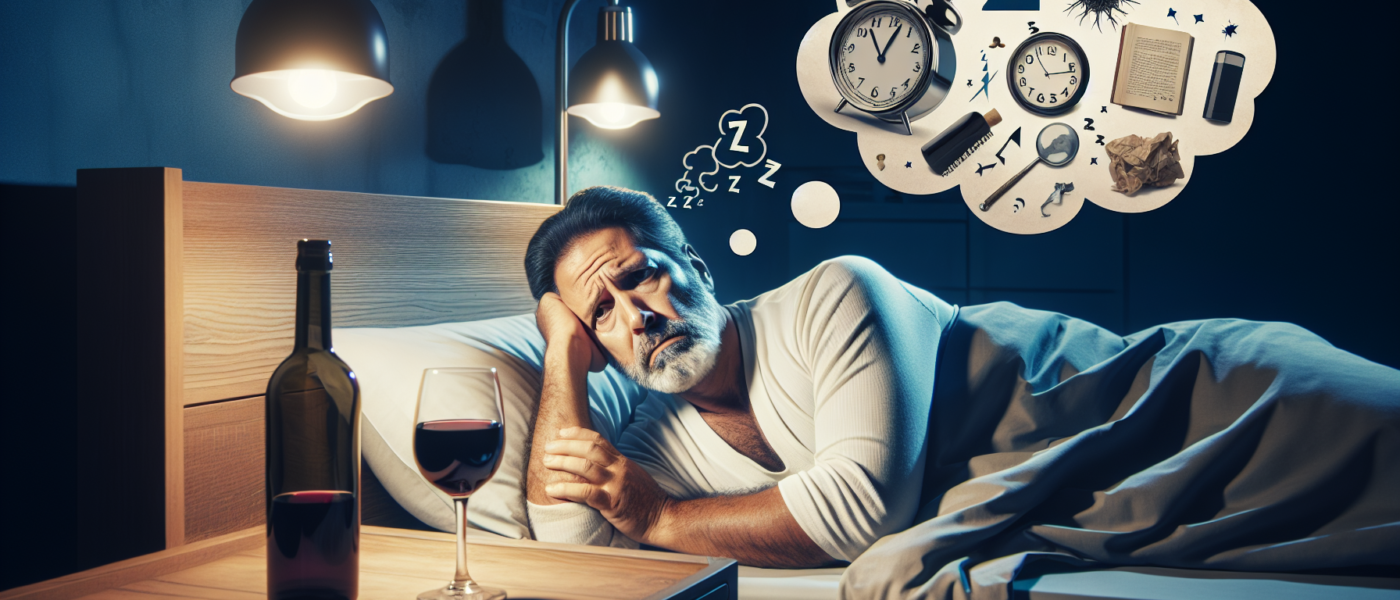How Alcohol Affects Sleep Quality in Men 50 and Older
Key Takeaways
- Alcohol can disrupt sleep architecture and reduce sleep quality in men aged 50 and older.
- Men over 50 may experience more pronounced disruptions due to the natural decline in sleep quality with aging.
- The relationship between alcohol and sleep is complex and multifaceted, impacting various stages of sleep differently.
- Moderation and awareness of alcohol consumption are crucial for maintaining good sleep hygiene and overall health in older men.
Introduction
As men age, maintaining good sleep hygiene becomes increasingly important. Numerous factors can impact sleep quality in older adults, and one of the most significant, yet often overlooked, is alcohol consumption. For men aged 50 and older, understanding how alcohol affects sleep is crucial for promoting better health and well-being.
Alcohol and Sleep Architecture
Alcohol impacts the natural sleep architecture, which consists of different stages including light sleep, deep sleep, and Rapid Eye Movement (REM) sleep. Each of these stages plays a vital role in overall sleep quality and physiological restoration.
Disruption of Initial Sleep Stages
Initially, alcohol can act as a sedative, making it easier to fall asleep. However, this initial benefit is deceptive. The sedative effect can lead to an increase in light sleep at the expense of deep sleep stages. Deep sleep is essential for physical recovery and cellular regeneration. Inadequate deep sleep can result in physical fatigue and decreased immune function.
Fragmentation of REM Sleep
REM sleep is critical for cognitive functions such as memory consolidation and emotional regulation. Alcohol consumption, particularly before bedtime, can significantly disrupt REM sleep, leading to increased sleep fragmentation. This means more frequent awakenings during the night, which can leave you feeling unrefreshed the next day.
Alcohol and Circadian Rhythms
The body’s internal clock, or circadian rhythm, is crucial for regulating sleep-wake cycles. Alcohol can negatively impact these natural rhythms. Disruption of circadian rhythms can lead to difficulties in falling asleep and staying asleep, ultimately reducing the overall quality of rest.
Phase Delays and Advanced Sleep Cycles
For older adults, natural shifts in circadian rhythms often result in earlier sleep and wake times. Alcohol can exacerbate these shifts, leading to phase delays (difficulty falling asleep) or phase advances (earlier wake times). Both scenarios can result in less sleep efficiency and overall poorer sleep quality.
Increased Risk of Sleep Apnea
Aging naturally increases the risk of sleep disorders, including sleep apnea. Alcohol can exacerbate these conditions by relaxing the muscles in the throat, increasing the likelihood of airway obstruction during sleep. For men over 50 who may already be at a higher risk for sleep apnea, alcohol can significantly worsen symptoms, leading to frequent awakenings and decreased oxygen levels during sleep.
Obstructive Sleep Apnea (OSA)
Obstructive sleep apnea is characterized by repeated episodes of partial or complete blockage of the airway during sleep. Even moderate alcohol consumption can increase the likelihood and severity of OSA. This condition can lead to significant reductions in sleep quality and increased daytime sleepiness, cognitive impairment, and cardiovascular problems.
Alcohol’s Impact on Sleep Quality Over Time
Chronic alcohol consumption can have long-term effects on sleep quality, particularly in men aged 50 and older. Over time, the negative impacts on sleep architecture and circadian rhythms can accumulate, leading to chronic sleep disturbances.
Tolerance and Sleep Disturbances
Regular alcohol consumption can lead to the development of tolerance, meaning that larger amounts of alcohol are required to achieve the same initial sedative effect. However, this increased tolerance can also lead to more severe disruptions in sleep stages and overall poorer sleep quality. These factors combined can create a vicious cycle of poor sleep and increased alcohol consumption.
Impact on Overall Health
Poor sleep quality is closely linked to several health issues, including cardiovascular disease, diabetes, and cognitive decline. For men over 50, who may already be at a higher risk for these conditions, alcohol-related sleep disturbances can significantly impact overall health and longevity.
Strategies for Improving Sleep Quality
While it’s clear that alcohol can negatively impact sleep quality in men over 50, there are strategies that can be employed to mitigate these effects and promote better sleep hygiene.
Moderation and Timing
One of the most effective strategies is to moderate alcohol consumption, particularly in the hours leading up to bedtime. Reducing the amount of alcohol consumed and allowing sufficient time before going to bed can help minimize its disruptive effects on sleep stages and circadian rhythms.
Healthy Sleep Habits
- Maintaining a regular sleep schedule: Go to bed and wake up at the same time every day, even on weekends.
- Creating a restful environment: Ensure your sleep environment is cool, quiet, and free from distractions.
- Limiting exposure to screens: The blue light emitted by phones, tablets, and computers can disrupt circadian rhythms. Try to avoid screen use at least an hour before bedtime.
- Engaging in relaxing activities: Activities such as reading, gentle yoga, or taking a warm bath can help signal to your body that it’s time to wind down.
Consulting Healthcare Providers
If you’re experiencing chronic sleep issues, it may be helpful to consult a healthcare provider. They can offer personalized advice and investigate whether underlying conditions, such as sleep apnea or other sleep disorders, may be contributing to poor sleep quality. In some cases, professional interventions such as cognitive-behavioral therapy for insomnia (CBT-I) or sleep studies may be recommended.
Conclusion
Alcohol consumption can significantly impact sleep quality, particularly in men aged 50 and older. By understanding the ways in which alcohol interacts with sleep architecture and circadian rhythms, and by employing strategies to mitigate these effects, older men can enhance their sleep quality and overall health. Moderation in alcohol consumption, coupled with strong sleep hygiene practices and professional medical advice when needed, can pave the way for better sleep and a healthier life.

